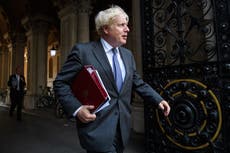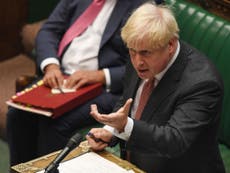Brexit: Minister will not commit UK to respecting rulings on disputes with EU
Senior Tory warns of ‘serious’ damage to UK’s international reputation
Your support helps us to tell the story
From reproductive rights to climate change to Big Tech, The Independent is on the ground when the story is developing. Whether it's investigating the financials of Elon Musk's pro-Trump PAC or producing our latest documentary, 'The A Word', which shines a light on the American women fighting for reproductive rights, we know how important it is to parse out the facts from the messaging.
At such a critical moment in US history, we need reporters on the ground. Your donation allows us to keep sending journalists to speak to both sides of the story.
The Independent is trusted by Americans across the entire political spectrum. And unlike many other quality news outlets, we choose not to lock Americans out of our reporting and analysis with paywalls. We believe quality journalism should be available to everyone, paid for by those who can afford it.
Your support makes all the difference.A government minister has refused to commit the UK to respecting the rulings of a panel set up to resolve disputes under the Brexit withdrawal agreement with the EU.
Northern Ireland Secretary Brandon Lewis told MPs that it would be “unhelpful and dangerous” for him to say that Britain would always abide by the arbitration panel’s ruling.
His answer got a scathing response from the chair of the House of Commons Northern Ireland Committee, Conservative Simon Hoare, who said that it risked “serious” damage to the UK’s international reputation and its chances of securing free trade agreements with countries elsewhere in the world.
Mr Hoare said it was “worrying” that the minister could not simply give the answer: “The UK will always abide by international arbitration. End of.”
Giving evidence to the committee, Mr Lewis stood by his comment last week that the government’s UK Internal Market Bill could result in Britain breaching international law “in a specific and limited way”.
But he said that this would be an “absolute last resort” if the UK had been unable to resolve disputes through the Joint Committee set up with the EU to oversee the implementation of provisions for the Irish border as well as the arbitration process created under Boris Johnson’s withdrawal agreement.
But asked by Mr Hoare if the UK would accept a panel ruling which went against it, he replied: “The problem is that of course in any situation, the technicalities and nuances are complex, they are complicated and small things can have a big impact.
“To get into a hypothetical about what possibly may happen is an unhelpful and dangerous place to be. Our focus is not getting to that place in the first place and getting a positive outcome from the Joint Committee negotiations.”
Mr Hoare - who did not vote with the government in Monday night’s vote on the bill - replied: “You are right that it is a hypothetical question, but one would always hope that as a country which abides by the rule of law, having entered into an arbitration process, one would accept the rulings.
“There are not many people in prison who accept the rulings of the judge, but they do so because that’s the way that justice works.”
Mr Lewis insisted that other countries could be confident that the UK was “a country that works in good faith to deliver on our agreements and will continue to do so.”
But the committee chair hit back: “One would hope that that would be the case, but I don’t that that would be the view of very many people in the international community and the business world at the moment.
“I don’t think that the seriousness of the damage that could potentially be inflicted on the reputation of the UK as a country that abides by the rule of law has been yet properly understood throughout government.
“The obvious answer is that ‘The UK will always abide by international arbitration, end of, hypothetical or otherwise’. It is worrying that that answer can’t be given.”
The arrangement for resolving disputes over the interpretation or application of the Brexit divorce deal was one of the most contentious elements of the agreement signed by Mr Johnson last year and pushed through parliament in the spring.
Under its terms, either the UK or EU can request the establishment of a five-member panel at The Hague, made up of two nominees from each side and a chair selected “by consensus” from a list of five jointly nominated by London and Brussels.
The agreement explicitly states that arbitration rulings are “binding on the Union and the United Kingdom”.
The text of the withdrawal agreement negotiated by Mr Johnson says: “The Union and the United Kingdom shall take any measures necessary to comply in good faith with the arbitration panel ruling and shall endeavour to agree on the period of time to comply with the ruling.”
Mr Lewis’s admission that implementing the prime minister’s bill would involve breaking international law has sparked a hail of condemnation, with all living former prime ministers and every Tory ex-leader apart from Iain Duncan Smith warning against the move.
There was speculation that the government was backing away from it after Scotland’s Tory Advocate General Lord Keen told the House of Lords that the bill did not breach international law and Mr Lewis had been “answering the wrong question”.
But Mr Lewis told the Northern Ireland committee that he had since discussed the issue with Lord Keen, who now accepted he had correctly stated the government position, as confirmed in advice from Attorney General Suella Braverman.
He confirmed that he was reading from a prepared text, but refused to say whether it had been written by Mr Johnson’s arch-eurosceptic adviser Dominic Cummings.





Join our commenting forum
Join thought-provoking conversations, follow other Independent readers and see their replies
Comments